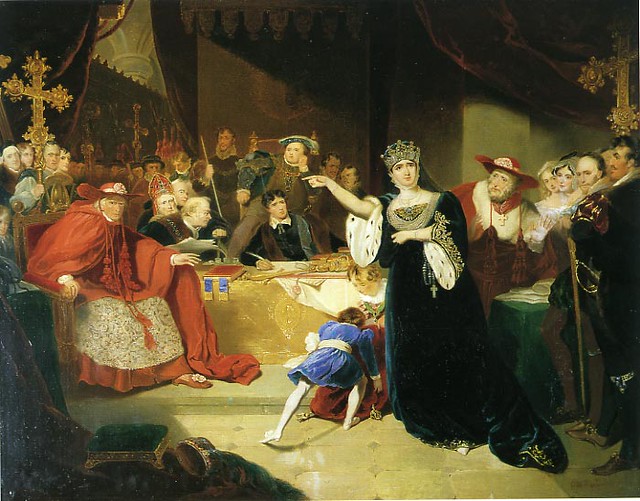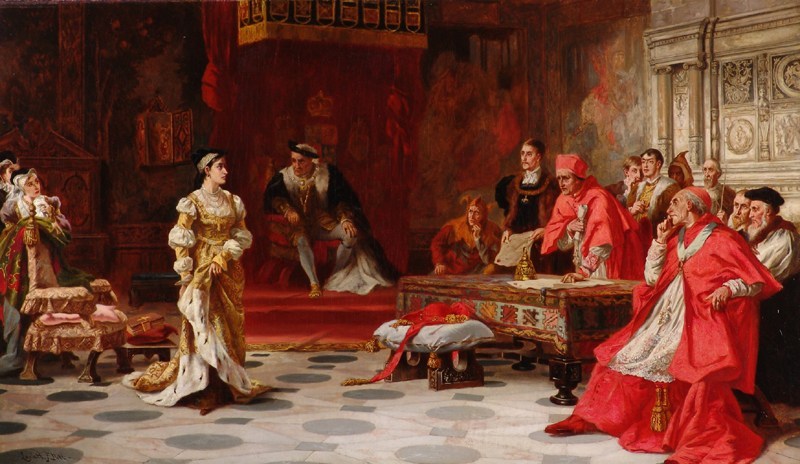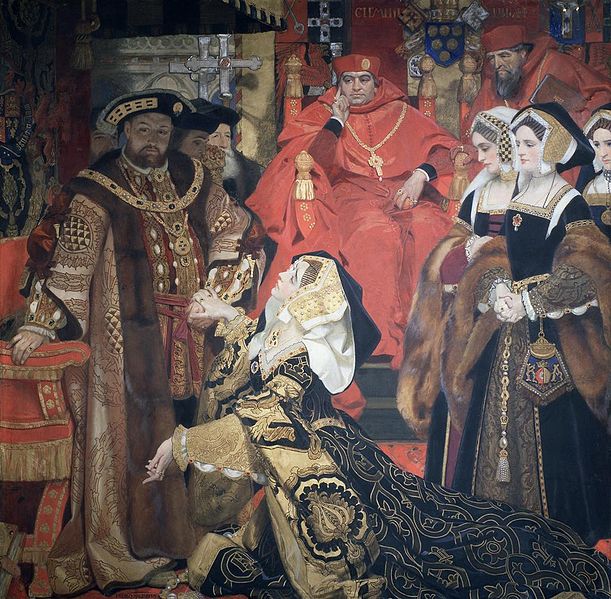On the 21st of June 1529, Catherine of Aragon spoke her famous speech at the Legatine Court at Blackfriars. After years of Henry VIII’s unsuccessful attempts to annul his union with Catherine, Cardinal Wolsey convened an ecclesiastical court in England with a representative of the Pope presiding – Cardinal Campeggio. The Papal Legatine court was held to determine whether the king’s first marriage was legal and valid.
Catherine of Aragon appearing before the Legatine Court at Blackfriars in 1529
The monarch was the first to speak to the court and people. Despite his burning desire to get rid of his consort, he cheered her as she entered. Then Henry pronounced a speech about his “love” for his wife, stressing that his conscience was badly troubled over the fact that he had married his elder brother’s widow. The faux sweetness of his tone must have been obvious, for he was so obsessed with Anne Boleyn at the time that he wanted Catherine out of his life forever.
However, the court at Blackfriars turned quite surprising for Henry. His queen circumvented the king’s plans by appealing directly to her royal spouse in the most dramatic way that made all those in attendance sympathetic to her cause, whether she told the truth or lied.
According to contemporary sources, Catherine said:
“Sir, I beseech you for all the love that hath been between us, and for the love of God, let me have justice. Take of me some pity and compassion, for I am a poor woman, and a stranger born out of your dominion. I have here no assured friends, and much less impartial counsel…
Alas! Sir, wherein have I offended you, or what occasion of displeasure have I deserved?… I have been to you a true, humble and obedient wife, ever comfortable to your will and pleasure, that never said or did any thing to the contrary thereof, being always well pleased and contented with all things wherein you had any delight or dalliance, whether it were in little or much. I never grudged in word or countenance, or showed a visage or spark of discontent. I loved all those whom ye loved, only for your sake, whether I had cause or no, and whether they were my friends or enemies. This twenty years or more I have been your true wife and by me ye have had divers children, although it hath pleased God to call them out of this world, which hath been no default in me…
When ye had me at first, I take God to my judge, I was a true maid, without touch of man. And whether it be true or no, I put it to your conscience. If there be any just cause by the law that ye can allege against me either of dishonesty or any other impediment to banish and put me from you, I am well content to depart to my great shame and dishonour. And if there be none, then here, I most lowly beseech you, let me remain in my former estate… Therefore, I most humbly require you, in the way of charity and for the love of God – who is the just judge – to spare me the extremity of this new court, until I may be advised what way and order my friends in Spain will advise me to take. And if ye will not extend to me so much impartial favour, your pleasure then be fulfilled, and to God I commit my cause!”
Just imagine! Catherine stood on her knees before Henry as she gave the speech of her life. It was a posture of absolute submission to her husband, but not surrender to his wishes. Had this speech been prepared in advance by Catherine? Had she planned to make it so emotional?
A depiction of Catherine’s dramatic speech before Henry VIII and the Legatine Court
Catherine was a very educated and smart woman, who was truly a political animal. She was destined to become herself as a daughter of Isabella of Castile and Ferdinand of Aragon. The purpose of planning a speech is to discover what should be said to an audience so that it has the most profound impact possible; preparation is also necessary to learn what should be omitted from the completed speech. I believe that Catherine had made every effort to ensure that at the court, her speech would be so moving that it would pull at everyone’s heartstrings, although Henry, Anne, her family, and her supporters must have been furious.
Henry gave his stubborn consort the option of entering a convent. At the time, history knew precedents of royal annulments. In 1498, Louis XII of France had claimed that his first spouse, Joan of France, was physically deformed, which had prevented him from consummating their union. His marriage to Joan had been childless. Louis had needed a fertile young wife (Anne of Brittany) to bear him sons in order to secure the Valois line, which had become highly important after the death of Charles VIII of France. At first, Joan had resisted this charge, but the Pope had granted the annulment. Then Joan had stepped aside and turned to the spiritual life.
Nevertheless, Catherine of Aragon seems to have never considered allowing Henry to marry Anne or any other woman. Could Catherine act differently? Her strong opposition to Henry’s annulment was caused by her steadfast desire to remain his wife for the rest of her life. She seems to have believed that it was her destiny to be Queen of England. She defended her right for the crown, as well as her daughter’s right to inherit the Tudor throne. If only Catherine had gone to a convent, how everything would have been different for England and for Henry, as well as for Mary Tudor, who could have been much happier in this case than she was in history.
Young Catherine and Arthur, Princes of Wales, from the Spanish Princess (TV Mini-Series 2019)
Had Catherine really been a virgin when she had married Henry? Or had she consummated her marriage to Arthur, Princes of Wales, before his death in 1502? The subject of Arthur’s health has been debated by historians over the years: some say that he might have been sickly, while others suppose that he had been a robust, healthy young man. Regardless of his health, Arthur was old enough to have reached his puberty by the time of his wedding to Catherine at the age of 15. Although the couple had been subjected to a standard bedding ceremony, later Catherine swore that she had never known Arthur carnally. Many historians and fans claim that Catherine’s famous piety proves the truth of her words, for such a religious woman could not endanger her immortal soul by lying. But wasn’t Catherine her parents’ daughter? The truth is shrouded in mystery.







